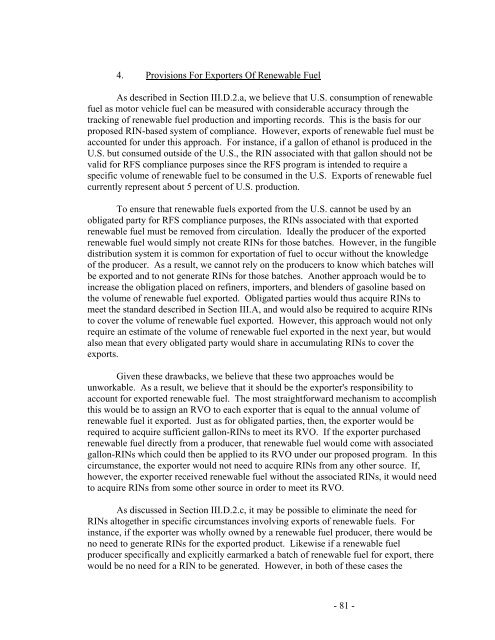Regulation of Fuels and Fuel Additives: Renewable Fuel Standard ...
Regulation of Fuels and Fuel Additives: Renewable Fuel Standard ...
Regulation of Fuels and Fuel Additives: Renewable Fuel Standard ...
Create successful ePaper yourself
Turn your PDF publications into a flip-book with our unique Google optimized e-Paper software.
4. Provisions For Exporters Of <strong>Renewable</strong> <strong>Fuel</strong><br />
As described in Section III.D.2.a, we believe that U.S. consumption <strong>of</strong> renewable<br />
fuel as motor vehicle fuel can be measured with considerable accuracy through the<br />
tracking <strong>of</strong> renewable fuel production <strong>and</strong> importing records. This is the basis for our<br />
proposed RIN-based system <strong>of</strong> compliance. However, exports <strong>of</strong> renewable fuel must be<br />
accounted for under this approach. For instance, if a gallon <strong>of</strong> ethanol is produced in the<br />
U.S. but consumed outside <strong>of</strong> the U.S., the RIN associated with that gallon should not be<br />
valid for RFS compliance purposes since the RFS program is intended to require a<br />
specific volume <strong>of</strong> renewable fuel to be consumed in the U.S. Exports <strong>of</strong> renewable fuel<br />
currently represent about 5 percent <strong>of</strong> U.S. production.<br />
To ensure that renewable fuels exported from the U.S. cannot be used by an<br />
obligated party for RFS compliance purposes, the RINs associated with that exported<br />
renewable fuel must be removed from circulation. Ideally the producer <strong>of</strong> the exported<br />
renewable fuel would simply not create RINs for those batches. However, in the fungible<br />
distribution system it is common for exportation <strong>of</strong> fuel to occur without the knowledge<br />
<strong>of</strong> the producer. As a result, we cannot rely on the producers to know which batches will<br />
be exported <strong>and</strong> to not generate RINs for those batches. Another approach would be to<br />
increase the obligation placed on refiners, importers, <strong>and</strong> blenders <strong>of</strong> gasoline based on<br />
the volume <strong>of</strong> renewable fuel exported. Obligated parties would thus acquire RINs to<br />
meet the st<strong>and</strong>ard described in Section III.A, <strong>and</strong> would also be required to acquire RINs<br />
to cover the volume <strong>of</strong> renewable fuel exported. However, this approach would not only<br />
require an estimate <strong>of</strong> the volume <strong>of</strong> renewable fuel exported in the next year, but would<br />
also mean that every obligated party would share in accumulating RINs to cover the<br />
exports.<br />
Given these drawbacks, we believe that these two approaches would be<br />
unworkable. As a result, we believe that it should be the exporter's responsibility to<br />
account for exported renewable fuel. The most straightforward mechanism to accomplish<br />
this would be to assign an RVO to each exporter that is equal to the annual volume <strong>of</strong><br />
renewable fuel it exported. Just as for obligated parties, then, the exporter would be<br />
required to acquire sufficient gallon-RINs to meet its RVO. If the exporter purchased<br />
renewable fuel directly from a producer, that renewable fuel would come with associated<br />
gallon-RINs which could then be applied to its RVO under our proposed program. In this<br />
circumstance, the exporter would not need to acquire RINs from any other source. If,<br />
however, the exporter received renewable fuel without the associated RINs, it would need<br />
to acquire RINs from some other source in order to meet its RVO.<br />
As discussed in Section III.D.2.c, it may be possible to eliminate the need for<br />
RINs altogether in specific circumstances involving exports <strong>of</strong> renewable fuels. For<br />
instance, if the exporter was wholly owned by a renewable fuel producer, there would be<br />
no need to generate RINs for the exported product. Likewise if a renewable fuel<br />
producer specifically <strong>and</strong> explicitly earmarked a batch <strong>of</strong> renewable fuel for export, there<br />
would be no need for a RIN to be generated. However, in both <strong>of</strong> these cases the<br />
- 81 -
















